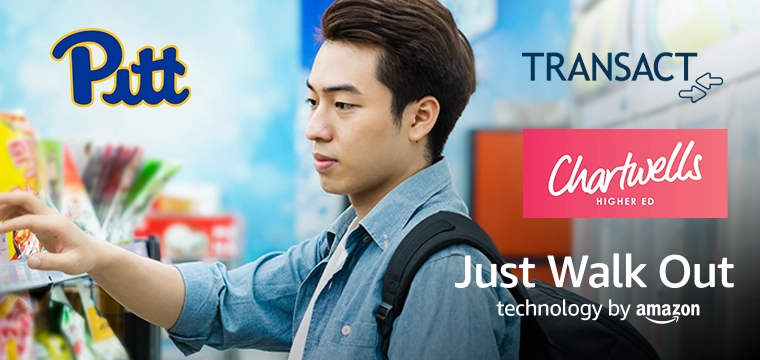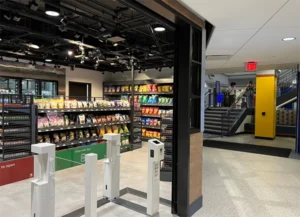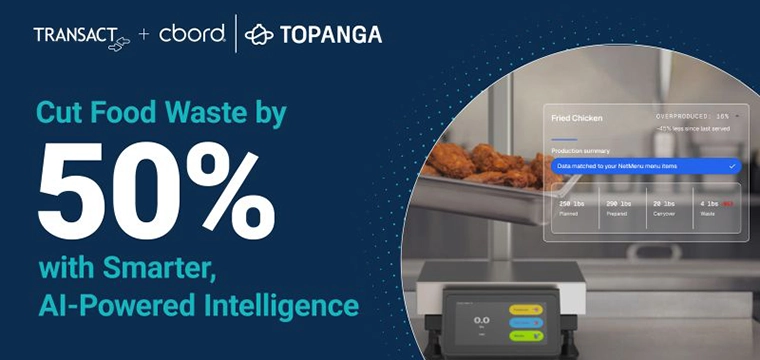
Amazon, Chartwells, and Transact power the popular retail location
In the summer of 2023, students at the University of Pittsburgh began grabbing items from an on-campus convenience store and walking right out the door. Amazon’s Just Walk Out technology powers the store and makes this frictionless experience possible. Using artificial intelligence, sensors, and cameras, it identifies the patron upon entry, tracks selected items, and charges the preferred method of payment as the shopper leaves the store.
The Market at Towers – in Pitt’s multimillion-dollar renovated dining facility – was the university’s first autonomous market deployment in partnership with Pitt, Chartwells, Transact and Amazon.
“While we have two other markets on campus, the Market at Towers sits in the center of our campus and is part of our main dining facility footprint,” says Julie Michelle Bannister, Assistant Vice Chancellor for Auxiliary Services, University of Pittsburgh. “It was important to have this first location included with our state-of-the-art renovation of The Eatery complex.”
Just Walk Out has allowed us to reallocate our staffing matrix, removing the traditional cashier and creating Customer Ambassadors. Our staff is now more mobile to stock the store and interact with patrons.
Pitt evaluated different unattended retail vendors before selecting Amazon, but they determined Just Walk Out would work best with their existing infrastructure and partners.
Transact already provided the widely-used mobile ordering app that enables the campus population to place orders from any of the on-campus dining locations.
“Because Amazon was able to seamlessly integrate with our Transact mobile app and accept our declining balance, we felt that their solution was the best fit,” says Bannister.
To enter the market, the user opens their Transact mobile ordering app and scans the QR code on the turnstile’s reader. As they choose their items, the Just Walk Out system uses an array of AI-driven cameras and sensors to detect what is taken from and returned to the shelves. When the shopping trip is complete, the customer simply leaves the store without waiting in line, visiting a cashier, or using a self-checkout station. The app automatically deducts the purchase amount from the shopper’s Dining Dollars, Panther Funds, or Pitt Cash accounts.
Bannister explains that the Transact mobile app currently accepts the stored value tenders, but they are working with their partners to add the meal swap as an option in future semesters.
Transact’s core role was to empower the Amazon technology to process the student campus card as a form of payment.
“Our Mobile Ordering platform not only provides the student with the ability to present their campus credential, but also handles complex sales scenarios, such as specific taxation, coupons and discounts associated with the item basket,” says Keith Kellermeyer, Product Manager, Campus Commerce. “We built a sophisticated way to synchronize menus from Cloud POS to Just Walk Out and certified the entire process with Amazon to ensure reliability and quality.”
To enable the Mobile Ordering app to display the QR code required to enter the store, Transact added additional screens to both the iOS and Android apps, as well as fields to the database and administrative dashboard.
Dining service provider Chartwells was also key to the enabling payments.
Transact’s Mobile Ordering platform enables administrators to set a minimum balance threshold for entry to the store, thus reducing the opportunity for a student to overspend their account.
“We worked directly with Transact and Pitt to build the operational functionality of the store set up and integration with our payment processing,” says Steve Schurr, Resident District Manager, Chartwells.
As a part of this core functionality, there is a minimum balance check to ensure that students have sufficient funds before they enter the store. This reduces the opportunity for a patron to overspend their account and depart the store with a negative balance. To accomplish this, students with less than $20 on their stored value balances – including meal plans, PittCash or Panther Funds – are prompted for another form of payment.
To accomplish this, Transact’s Mobile Ordering platform was modified to enable administrators to set a ‘minimum balance threshold’ for entry to a Just Walk Out location.
In the field, the Mobile Ordering app performs a balance inquiry against one or more of the customer’s campus card accounts. Once the balances of all accounts are returned, the system checks against the minimum balance threshold. If the customer has sufficient funds, the QR code is generated and displayed in the app.
“Stepping through each scenario of processing a payment after the transaction had occurred helped us carefully craft the business rules around when to allow and deny entrance and how to reconcile transactions between systems,” says Kellermeyer.

University of Pittsburgh's Market at Towers
In the past, the Market required four cashiers plus two team members stocking shelves during high trafficked hours.
Because the technology eliminates checkout lines and expedites shopping, the location now serves students 24 hours a day in an even more effective and efficient way. At times it can be staffed as usual, but it can also operate virtually unattended at night and on weekends.
Chartwells manages the operations and restocking for the store. They also serve as the direct liaison with Amazon. Pitt supports the ongoing maintenance and IT support, but day-to-day operations fall mainly to the Chartwells’ team.
“Just Walk Out has allowed us to reallocate our staffing matrix to be more customer focused, removing the traditional cashier and creating Customer Ambassadors,” says Schurr. “Our staff is now more mobile to stock the store and interact with patrons.”
Since the opening week, daily sales have risen steadily. The team credits this in part to the utilization of Amazon's data insights to optimize the product mix. Also key is the staff’s continued education of first-time customers.
“Through team member training and customer education we are seeing a continuous increase in sales since the store opened,” says Schurr. “As we continue to adapt and analyze our business, we are finding more opportunities to grow and engage students.”
In the future, Bannister says they plan to expand offerings to include full grab-and-go combo meal options, which should drive sales even higher.
Just Walk Out’s analytics portal provides insight into customer behavior and shopping habits, enabling a next-gen approach to store programming.
The early success has already brought on the addition of a second location. At Pitt’s Petersen Events Center, an Amazon-powered market enables attendees to purchase concessions without waiting in lengthy lines.
When asked what advice she would have for other campus administrators considering a similar project, Bannister advises to take your time.
“We were faced with a construction project that had additional challenges, and having more time for testing with our staff would have been helpful,” she says. “I also would recommend having a solid communication plan because engaging students early for adoption is important.”
Chartwells’ Schurr agrees that communication is crucial.
He says the student population was somewhat hesitant initially, but they became comfortable as his team engaged and educated them on the process.
The biggest piece of advice he can offer, however, is to leverage the tools available through Just Walk Out’s analytics portal.
“It provides insight into customer behavior and shopping habits, enabling a next-gen approach to store programming,” he explains. “You need to understand that this technology will shift the sales matrix and so you have to stay agile with your offerings.”




